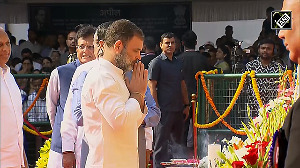Sumit Ganguly is director of the India Studies Program at Indiana University, Bloomington and a South Asia expert. Professor Ganguly's research and writing interests are focused on South Asia. He has published extensively in the areas of ethnic conflict, inter-state war and defense and security policy. His articles have appeared in Asian Affairs, Asian Survey, the Bulletin of the Atomic Scientists, the Journal of Asian and African Affairs, the Journal of Commonwealth and Comparative Politics, Foreign Affairs, the Journal of Strategic Studies, International Security, Survival and the Washington Quarterly.
His most recent work, published by Columbia University Press and Oxford University Press (New Delhi), is entitled Conflict Unending: India-Pakistan Tensions Since 1947. He also recently published The Crisis in Kashmir: Portents of War, Hopes of Peace.
"Any renegotiation of the Indo-US nuclear deal will have torpedo the deal and also have a deleterious effect on foreign investment to India," he tells Aditi Phadnis.
The Left says annual certification is an obligation of the US President and the fact that it does not find a place in the 123 Agreement is not relevant. They say the issue is if a good conduct certificate is not forthcoming or if the US Congress does not accept the good conduct certificate (on issues ranging from Iran to anything that may come up in the future), it would have implications for the 123 Agreement. The Left says in such a case the US could terminate the agreement, with all its consequences for our civilian nuclear energy programme. Are they right?
Annual certification is virtually a ritual the President of the United States has to go through. Unless there is some egregious breach, I cannot visualise a circumstance where this could become a serious problem.
Can you recall recent history which this kind of certification has kicked in? Or when it has been a problem.
The only case where certification was a problem -- and opinion is divided on this -- was in 1990 under the Pressler Amendment. The US President in 1990 could not certify that Pakistan did not possess an explosive nuclear device. I've always been skeptical about this, because miraculously, just after the Soviets withdrew from Afghanistan and Pakistan was no longer useful, Pakistan had crossed certain red lines. I've spoken to the State Department lawyer at that time. He was legally bound not to reveal classified judgments but he told me Pakistan did cross certain red lines in 1990. Of course, these things are subject to legal interpretation. But how did they (the US) ascertain that Pakistan crossed the red lines in 1990? Who knows.
The relation between the US and Pakistan was completely instrumental. We're now talking about the relationship between India and the United States entering a completely new phase. This is not a matter of using India to meet immediate interests. This is much more a matter of putting India on a vastly different footing.
Unfortunately, people are focusing far too much on specific meanings of one sentence or one phrase and tying themselves in knots over it. Much of the Left's hostility stems from their doubts about a viable relationship with the United States rather than the particulars of the agreement.
Why should naval exercises or a joint defence agreement be linked to the nuclear agreement? And about Iran, that is just dishonesty on the part of the Left. The Iranians, regardless of what one feels about the regime, signed the NPT. That is a solemn obligation. They could have been like India, which had the courage of conviction. India said, "This is an unequitable treaty. We were a part of the 18-nation Disarmament Conference in Geneva, but you have changed the terms of the treaty. We're not going to sign this."
India paid the price. It was denied civilian nuclear technology all these years. If you join the treaty, abide by its terms. Or declare there is a supreme national interest and withdraw and face the consequences. You can't have it both ways.
The notion I find most obnoxious is that this country's prime minister will sell out India's almost-fierce independence in foreign policy just to get some nuclear rectors from the United States. This insults the prime minister.
Furthermore, the notion the US will once again walk away in an arbitrary fashion from the obligations of the agreement -- there is no basis for this. Certain areas (in the 123) where there are continuing disagreements have been left vague. This is standard in international negotiation. As the relationship becomes more robust, it will become more difficult for the United States to walk away.
When Tarapur (atomic power plant near Mumbai) happened, there was no relationship worth the name. Today, there is a viable relationship and one of increasing complexity and substance. Ironically, that is what the Left fears, that this will solidify the relationship.
What you're saying is that the agreement is not affected by the Hyde Act, that it does not impose any obligation on India to consult the United States in what it wants to do in foreign policy.
The only thing which will really be restricted will be the 14 reactors that will come under the International Atomic Energy Agency safeguards. But the government has successfully circumscribed the other eight. And also, for all the talk by the Left of self-reliance and the like, if the country was doing so well, why are there so many shortfalls, cost overruns, periodic accidents ?
Largely because India has been insulated from access to advanced technology, from radiation-shielding equipment. Now, the industry will be subject to rigorous global standards. And the US is not necessarily the world leader in this, the French are, because they depend heavily on nuclear power for their energy needs. Once the Nuclear Suppliers Group blesses this project, you can purchase things from anybody you want as long as you remain within the confines of civilian nuclear technology.
One section of the Opposition has said it wants the agreement renegotiated. Another has said it wants a halt to its operationalisation. What happens if India does this?
It is utterly impractical. That's a way of torpedoing the agreement. 123 is not the only priority for the Bush Administration.
Also, the administration doesn't have much time. There's going to be an election next year. The election season opens up later this fall (in September). The ability of the administration to devote more resources is doubtful
And then, renegotiate in what fashion? And what assurances does the prime minister have that the Left will not come up with further objections? This is just a clever way of trying to torpedo the deal. And I think the prime minister has to take an absolutely unyielding stand.
If he agrees not to take negotiations to the next level, that is, the IAEA and the NSG, the deal is as good as finished. It will also raise serious questions in Washington long after the Bush Administration has become history that "we can't negotiate with India in good faith", that even a prime minister seemingly as transparent as Manmohan Singh could not deliver the goods and we should be extremely skeptical of negotiating with India. This will have a profoundly chilling effect on government-to-government relations, and an equally deleterious effect on foreign investment in India.
When foreign investors look at India and see that the ability of the government to deliver on certain critical matters is under question and we should be suitably skeptical well, I don't have to spell it out for you.







 © 2025
© 2025